Surround and Conquer
Geopolitical Strategies Influenced by Weiqi (GO)
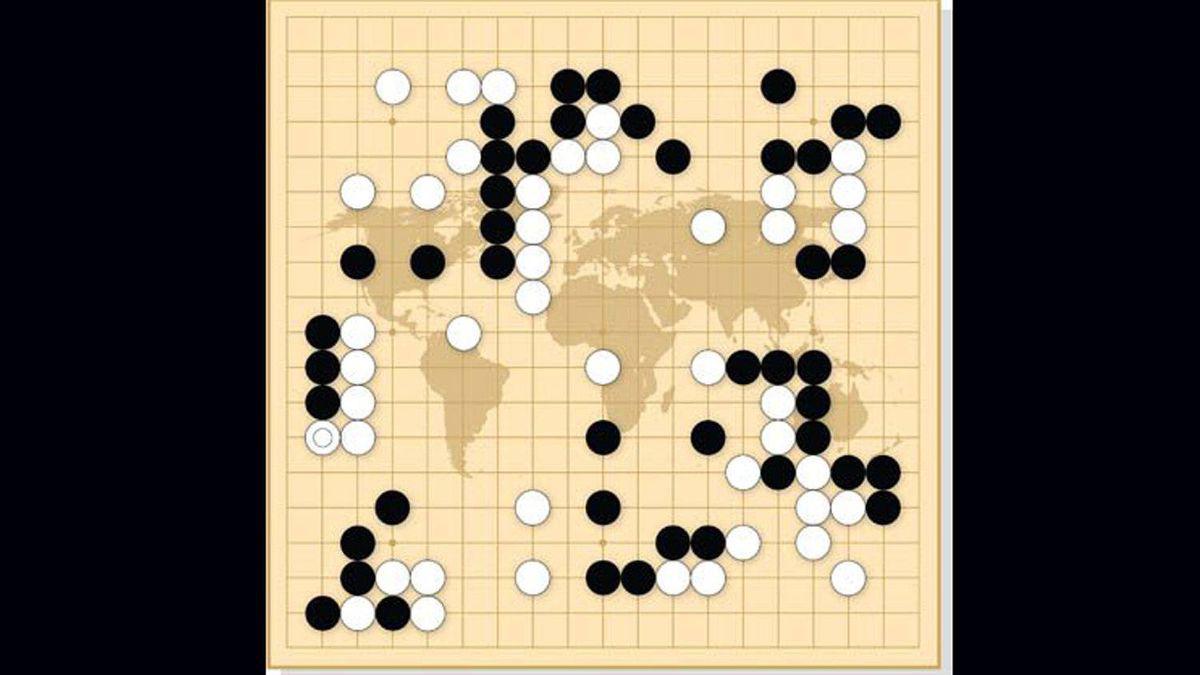
A Game of GO being played out across the world. (source)
For anyone with experience playing both chess and GO it becomes immediately apparent how the two games differ strategically. Chess, a game of straightforward tactics, is a game of player vs. player. While GO, a game of subtle incremental strategy, is a game of player vs. the self. It has long been analogized that the Western World perceives geopolitical strategy like a game of chess. Only in the last couple of decades has it come to the attention of the West that the nation of China may be playing an entirely different game.
That game is Weiqi ( 圍棋 ), Chinese for GO.
Are you into Podcasts?
Come chat with your friends and all your favorite podcasters!
- Create a profile
- Follow podcasts
- Follow your friends
- Start discussing all your favorite episodes!
Weiqi, at nearly 3000 years young, is the oldest strategy board game in the world. Originating from China, weiqi has infused itself into the Chinese psyche. Nearly every aspect of Chinese strategic thinking is deeply influenced by weiqi. The principle strategy in weiqi is to surround your opponent with overwhelming control over territory. The ancient wisdom in weiqi, is in how to do that well. Secretly the true battle is not against the opponent, but within yourself as a participant.
Diligent study should be applied to an art form if one wishes to master it. Strategy as an art can be approached in an endless number of ways. Similar to martial arts, studying weiqi requires the student to introspect their own nature. While chess requires a player to overcome their opponent, weiqi requires the player to overcome themselves. These differences in strategy reveal a stark contrast between Western and Eastern geopolitics. If the West ever hopes to understand Eastern thinking, especially China’s geopolitical stratagem, then a thorough study of the Game of GO will be required.
GO as Strategy:
Weiqi is a game of life and death; that is to say the life and death of the stones. The name weiqi literally means “surrounding game.” As the name would imply, the game is about surrounding. More aptly, the game is about surrounding territory and the opponent’s territorial influence. When stones are surrounded completely, with no liberties, then the stones die and are removed from the board. Stones must have an open liberty, or an open cross section directly adjacent to them, in order to stay alive and remain on the board.
Territorial Game:
There is a direct relationship between the stones and the liberties they influence. This influence translates to territorial supremacy. Experienced players may foresee long term strategies in intersecting wide open spaces on the board, as to ensure territorial influence later in the game. Rookie players often make the mistake of focusing too long on localized battles over smaller regions. It is important to choose your battles wisely in weiqi. A master weiqi player knows when to lose a battle so that they may win the war.
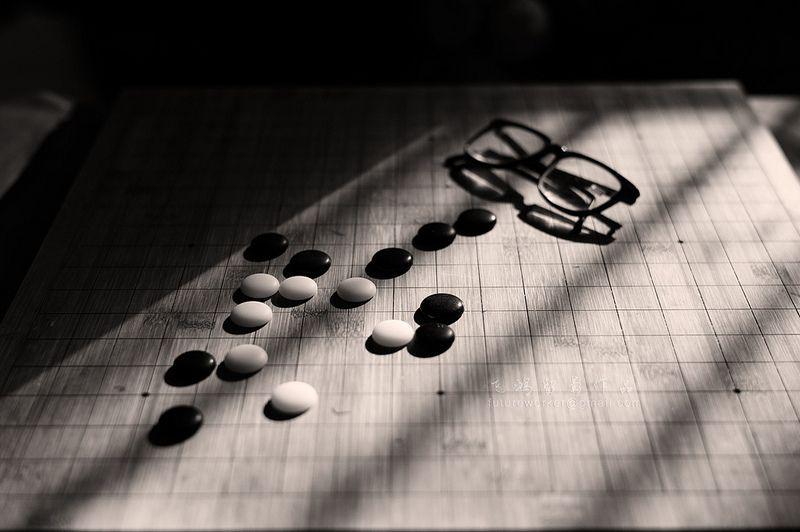
(source)
Before the weaker player realizes what has happened, the master player will have secured the board for victory. Like the infamous analogy of a frog in boiling water, as the water slowly boils the frog does not notice the increase in temperature and so does not escape its impending doom. When playing a good game of GO, the weaker player undergoes a slow boil against the master player. This cunning stratagem developed over thousands of years by studying millions of weiqi games. China, the ancient masters of weiqi, seeks to apply their territorial strategies on the global scale.
GO China GO:
China takes weiqi very seriously. Similar in Russia where they teach chess as a matter of state-interest in growing strategic thinkers, China likewise instructs their population upon the intricacies of weiqi. It is prescribed learning for China’s military, and their officers pride themselves in their weiqi skills. Weiqi is so pervasively important in Chinese culture and history, that when AlphaGO (United Kingdom’s Deepmind artificial intelligence(AI) GO playing program) defeated world master baduk (Korean for GO/Weiqi) player at weiqi in the 2016 Google Deepmind Challenge, China felt a personal affront to their existential relevance on the world stage against the West.
AlphaGO was China’s Sputnik moment.
On October 4th, 1957 the Soviet Union launched the first artificial Earth satellite, Sputnik 1, into orbit. During the advent of nuclear weapons, the sudden low Earth orbit achieved by Sputnik shocked the Western world and jump-started the American space program. As history would record, this triggered the United States to form NASA and land on the Moon just 12 years later.

Soviet Scientist inspecting Sputnik 1 before launch. (source)
AlphaGO did for China in the AI race, as Sputnik did for the US in the space race. But this time, it was personal. Weiqi is an emblem of Chinese culture and heritage. Having a Western nation show it can defeat their time-immemorial game with a machine only enflamed the Chinese determination. China had an awakening in realizing how AI could be used to not only master the game of weiqi, but to also master the overall universal strategies of weiqi. From the military to economics to geopolitics, China uses weiqi logic in determining their next step.
But just how is China using strategies from weiqi in geopolitics?
The Belt and Road Initiative:
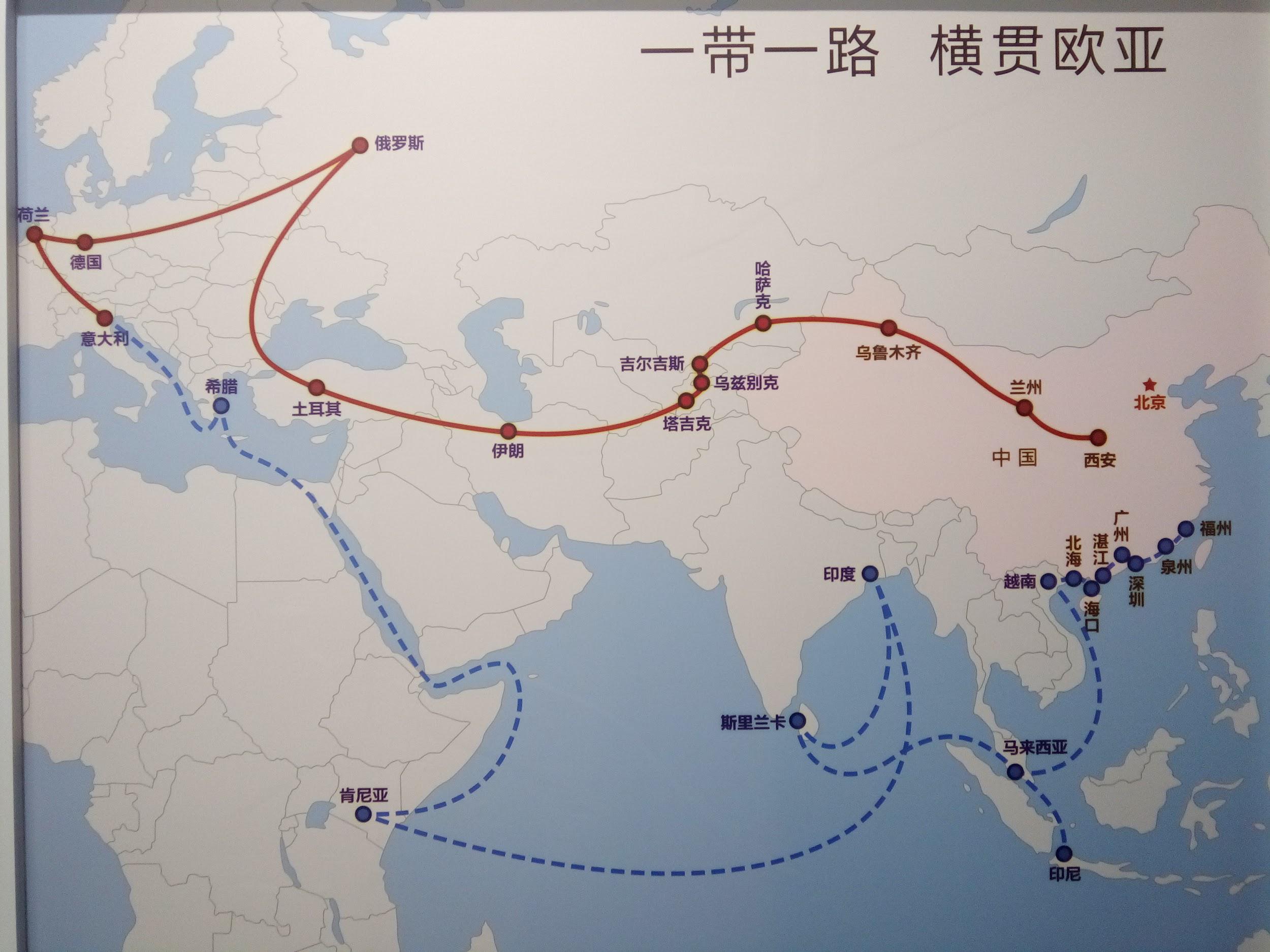
Shenzhen City Planning Exhibition Hall world map one belt band one road Jan 2017
One of the more relevant contemporary examples of weiqi strategy being used in geopolitics is the Belt and Road Initiative (BRI). China’s grand economic plan to revitalize the ancient Silk Road began in 2013 under the Chinese Communist Party (CCP) leader Xi Jinping. The project is expected to cost near 18 trillion dollars upon completion in 2049, and connect over 100 nations into a mega-trade-network. Everything from roads, railways, power stations, telecommunications, military bases, airports, sea-ports, tunnels, bridges and everything transport will be built. Nothing can quite compare in scale and scope as infrastructure projects go, except for the Great Wall, another of China’s massive building projects. The BRI is expected to reduce world trade costs up to 2%, and save regional nations along the network over 10% in costs.
If the world was a weiqi board, then China is making a bold cut through the middle to intersect the current hegemonic economy. By building the BRI project, China stands ready to take its place as the next economic superpower. The BRI could lift many third world nations out of poverty by giving them the infrastructure boost they've been needing. Not only will the BRI make China and the world richer, but it also allows for China to have greater bargaining power while at the negotiating table. This would be similar in a way to weiqi’s strategy to secure strong active positions, as to deter or suppress the opponents territorial expansion. Each port, road, base, and development is like a weiqi stone projecting its influence over the board.
Are you into Podcasts?
Come chat with your friends and all your favorite podcasters!
- Create a profile
- Follow podcasts
- Follow your friends
- Start discussing all your favorite episodes!
Salami Slicing:
The typical weiqi geopolitical strategy China is notorious for is a form of something known as salami slicing strategy. The name comes from the method used to slice a little off at a time; typically land or territory, but also technology, culture, economy, sovereignty, even demography slicing. Salami slicing places an emphasis on incremental gain over time rather than total immediate gain. Take a little now and have a little more later. It is a slow boil type game as with the frog in hot water. Perform it too fast and become noticed, move too slow and the gain is hardly profitable, but take at just the right rate and your opponents will be none-the-wiser.
What's mine is mine and what's yours is negotiable...
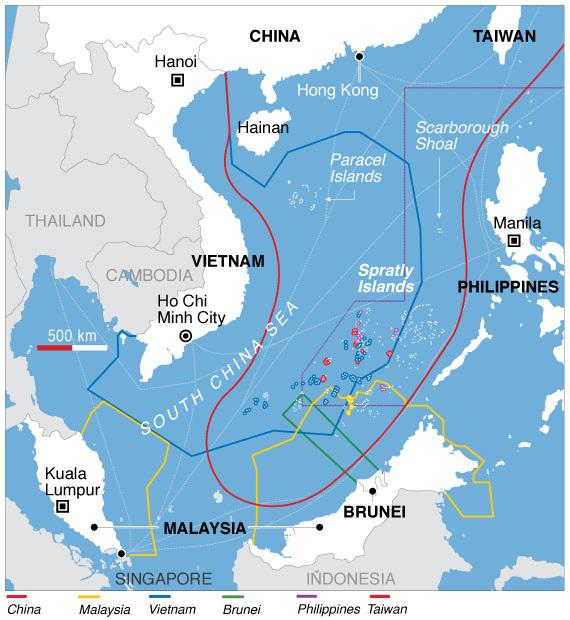
One example of China’s salami slicing strategy, has been incrementally increasing its sphere of influence in the South China sea over the last half century. Territorial disputes have become business as usual. Mostly over islands and drilling rights for natural resources. Part of China’s tactics are to literally create new islands from scratch located within the disputed zone and then claim them as their own. On a weiqi board this would look like placing stones slowly over time within the opponent’s territory of control to gradually dissolve their claim. Along with producing islands and pushing their claim boundary, China is also ramping up its military and naval forces. Especially their navy. Having a strong naval presence in the South China sea will allow China to be able to better protect their cargo ships, instead of having to rely on US protection. Eventually China wants to completely take up the role of protecting the trade waters in the South China sea without the help of the US. Slicing a little here and little there has gained China a lasting influence in the waters off their coasts.
Shi:
In Sun-Tzu’s Art of Warfare there is a chapter titled Shi. Shi is an abstract concept difficult to define in english. While the literal meaning may mean something along the lines of "strategic advantage" the concept is much more nuanced. The idea of shi is to actualize the essence of influence over a battle. It is thought that shi is the core essence in weiqi strategy, underpinning all other aspects of the game and Chinese strategic thought. To truly master weiqi, one must fully develop shi.
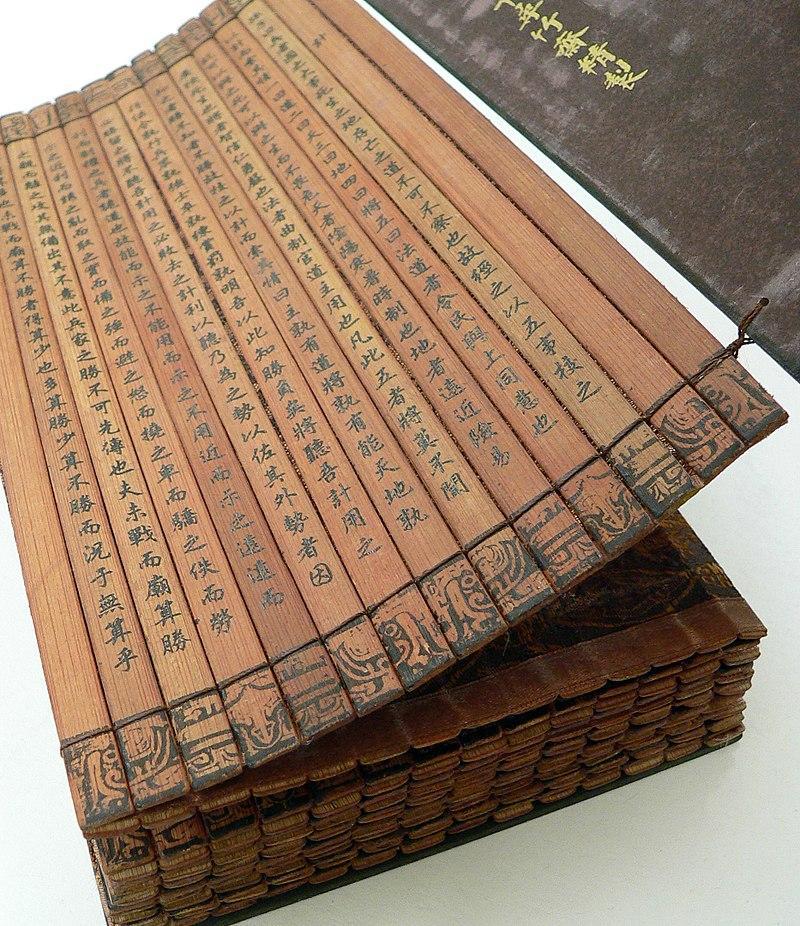
"That the velocity of cascading water can send boulders bobbing about is due to shi. That a bird of prey when it strikes can smash its victim to pieces is due to its timing. So it is with the expert at battle that shi is channeled and his timing is precise." ~Master Sun-Tzu, The Art of War Ch. 5 on Shi
Shi is knowing exactly when, where, and how to strike. It is the “getting into the zone” experience of strategy. When a player is in the “zone” they have shi and victory is final. Chinese strategists seek to find this sweet spot of shi. When planning a project or a campaign, the Chinese will be keenly aware of gaining the strategic advantage of shi. Food for thought whenever playing a game of geopolitics or weiqi against a Chinese opponent.
America Encounters Weiqi:
China is not the only culture to exhibit qualities of weiqi into their strategy. Vietnam came upon Sun-Tzu and weiqi from Chinese history, while others, like the Native Americans, have developed guerrilla warfare weiqi-esq strategies independently. While this article’s main intent is to shed light on China’s direct use of weiqi strategies on the world stage, it serves to elucidate China’s geopolitics by contrasting it with a couple of historical American encounters with weiqi strategy.
Vietnam:
During the Vietnam war the United States faced an opposition threat unlike anything previously experienced during America’s wars. The Vietcong at the time adopted strategies inspired by Mao Zedong, founder of the People’s Republic of China in 1949. Naturally these strategies drew greatly from weiqi and the concept of shi. With hit & run guerrilla warfare tactics, the vietcong rarely attempted a direct assault against the US, choosing rather to hide in tunnels and emerge only to strategically distract the US soldiers.
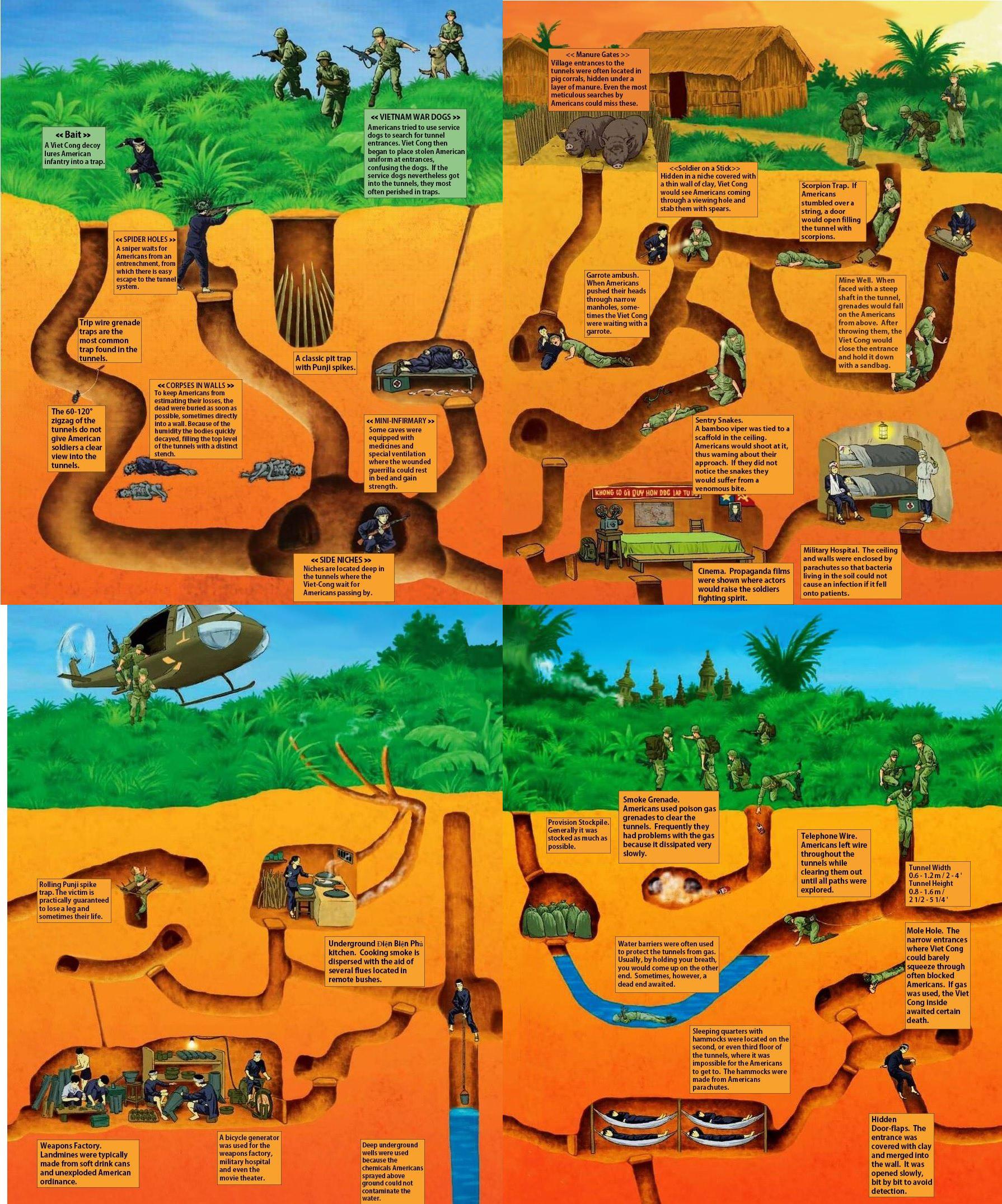
Tunnel life created a monstrous storm of circumstances faced by both the vietcong and the United States. (source)
These tunnel strategies developed by the Vietcong resembled a weiqi game where the player places stones across a wide spread on the board. By not focusing too much on any one point on the board a player can distract the opponent from the overall objective. The Vietnam war was arguably one of the most brutally fought conflicts in world history. Weiqi strategies taken up by the Vietcong proved devastating to the American soldiers. After a long and hard fought conflict by both sides, President Nixon finally pulled out US troops in 1973.
After the American pullout the Vietcong began salami slicing the rest of South Vietnam.
"You know you never defeated us on the battlefield,” said an American colonel. The North Vietnamese colonel pondered this remark a moment. "That may be so," he replied, "but it is also irrelevant."
—Conversation in Hanoi, April 1975
Comanche guerrilla warfare:
While not directly influenced by Chinese weiqi, Comanche guerrilla warfare tactics share much in common with the ancient game. The Comanche horse warriors of the American Plains were so overwhelmingly dominant that against the full force of the American western military they still held their ground and their territory for over a century. GO Comanches GO!

Three of the last Comanche Warriors 1892. (source)
After being introduced to the horse the Comanches quickly became the most powerful Native American tribe; even simultaneously coming against the French, Spanish and the Americans. They utilized a combination of raiding tactics and hybrid hit & run guerrilla warfare. But the Commanche’s crowning shi was their mobility. With relatively few numbers they were able to exercise mobile influence over the entire territory of the Great American Plains. In weiqi terms, the Comanches commanded total influence over the board with perfectly placed stones. Ultimately the only way they were able to be defeated was when their food supply, the American Bison, was hunted to near extinction.
What can the West do?:
By now the impression may be growing that the West is not very good at this whole weiqi strategy thing. Very true we do not have thousands of years of experience mastering shi. But we do have modern available resources available to us, like the Game of GO app, to play and practice weiqi like never before. The single thing we can do is learn how to play weiqi. As China grows in influence and eminence, it will become all the more necessary for the West to comprehend how China, and the East in general, processes geopolitical variables.
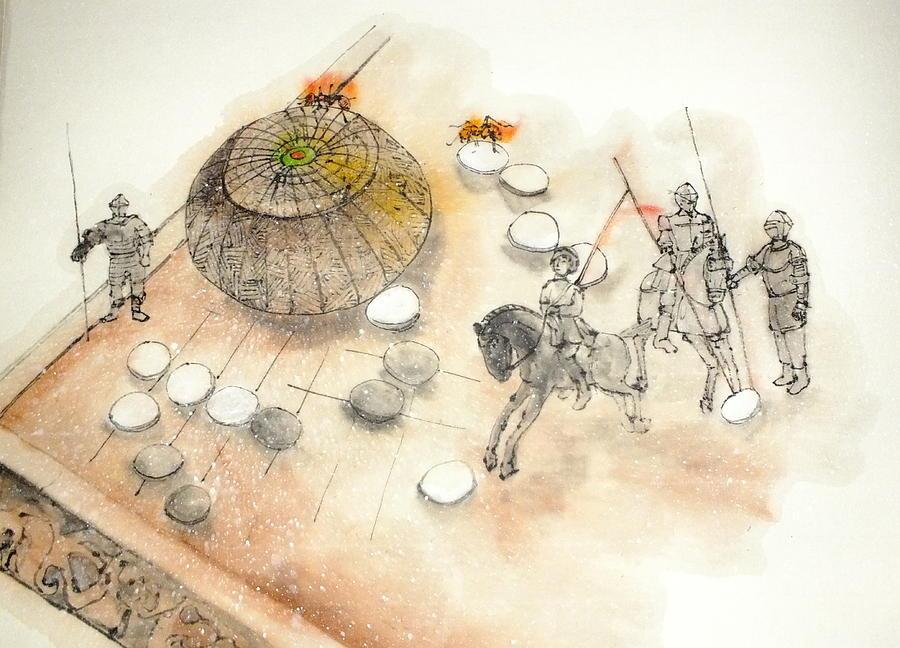
Soldiers mulling over territory on a weiqi board. GO Game Album by Debbi Saccomanno Chan.
China is the fastest growing economic and military presence in the world. In less than half a century they grew their GDP from 90 billion to over 12 trillion dollars. In 2013 they began the Belt and Road Initiative. Since 2016 they have mobilized a massive effort toward AI development, practically catching up to America’s level in less than a handful of years. There is no question that China is rising. The question is how should the rest of the world respond? With open arms and appreciation for all their commitments to world prosperity, or with apprehension and reserve to their shi?
Traditionally the West has developed a strategic mindset around the concept of divide and conquer. If we hope to respond effectively to the East (China), then we will need to understand their way of Surround and conquer.
The first line of response we have is for you to learn GO, Play GO, and Master GO!
"There cannot be two suns in the sky."
~Confucius
Are you into Podcasts?
Come chat with your friends and all your favorite podcasters!
- Create a profile
- Follow podcasts
- Follow your friends
- Start discussing all your favorite episodes!
